Self-Assessment and Reflective Essay in Human Resource Management
VerifiedAdded on 2022/11/19
|9
|1947
|415
Report
AI Summary
This reflective essay examines the author's personal fitness for a business environment, focusing on knowledge, abilities, and skills, along with plans for improvement. The essay begins with an introduction to the importance of knowledge and skills in both academic and professional settings, emphasizing the need for employees to adapt to the changing business landscape. The author conducts a self-assessment, identifying strengths and weaknesses through a SWOT analysis. The essay explores the development of skills through day-to-day activities and academic experiences, highlighting the application of skills like motivation, creativity, and communication. It then describes the use of Kolb's learning cycle to understand preferred learning styles and Gibbs' reflective cycle to analyze experiences and plan for future development. The author concludes by summarizing the key takeaways from the self-assessment, emphasizing the importance of continuous learning and skill enhancement for success in the workplace.
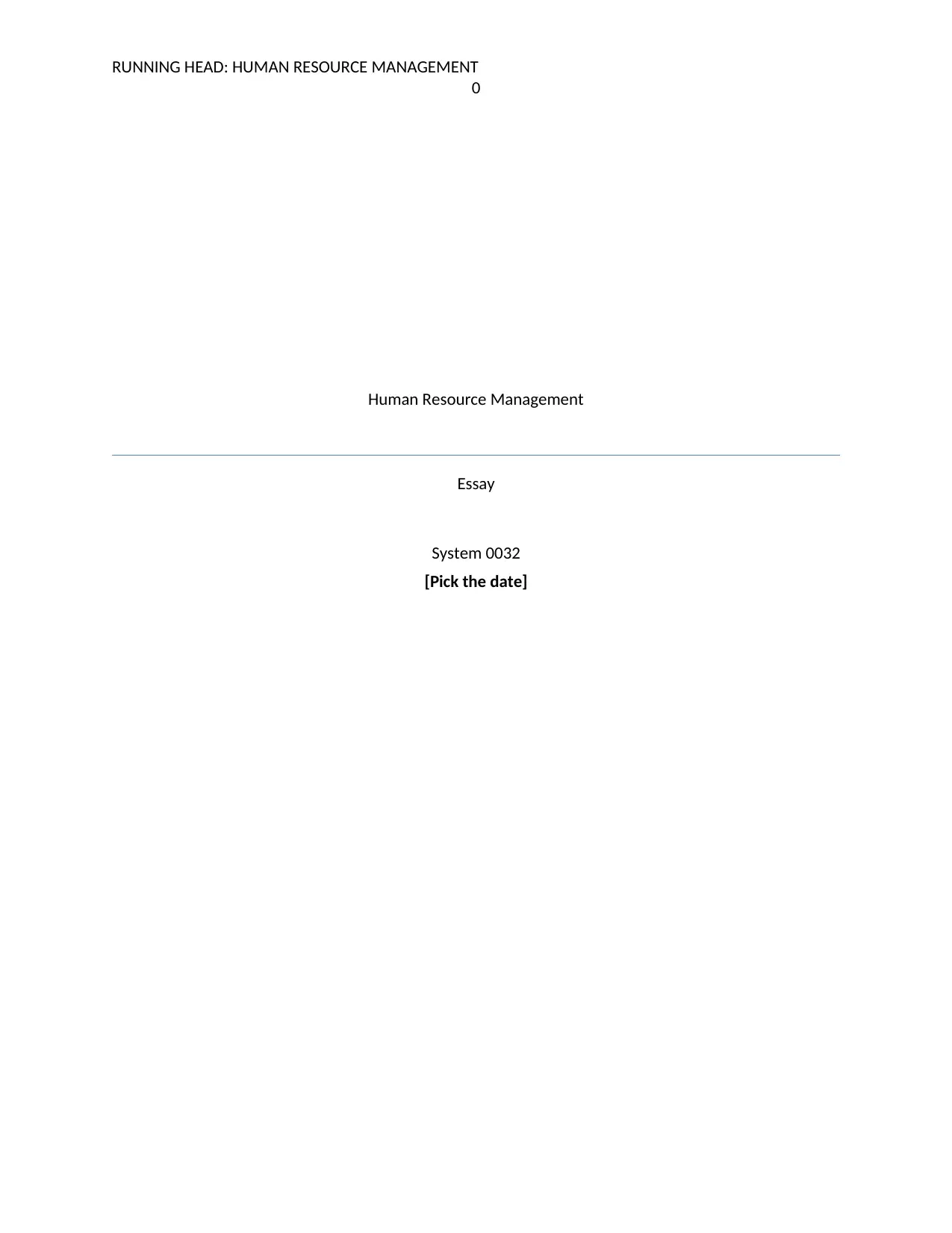
RUNNING HEAD: HUMAN RESOURCE MANAGEMENT
0
Human Resource Management
Essay
System 0032
[Pick the date]
0
Human Resource Management
Essay
System 0032
[Pick the date]
Paraphrase This Document
Need a fresh take? Get an instant paraphrase of this document with our AI Paraphraser
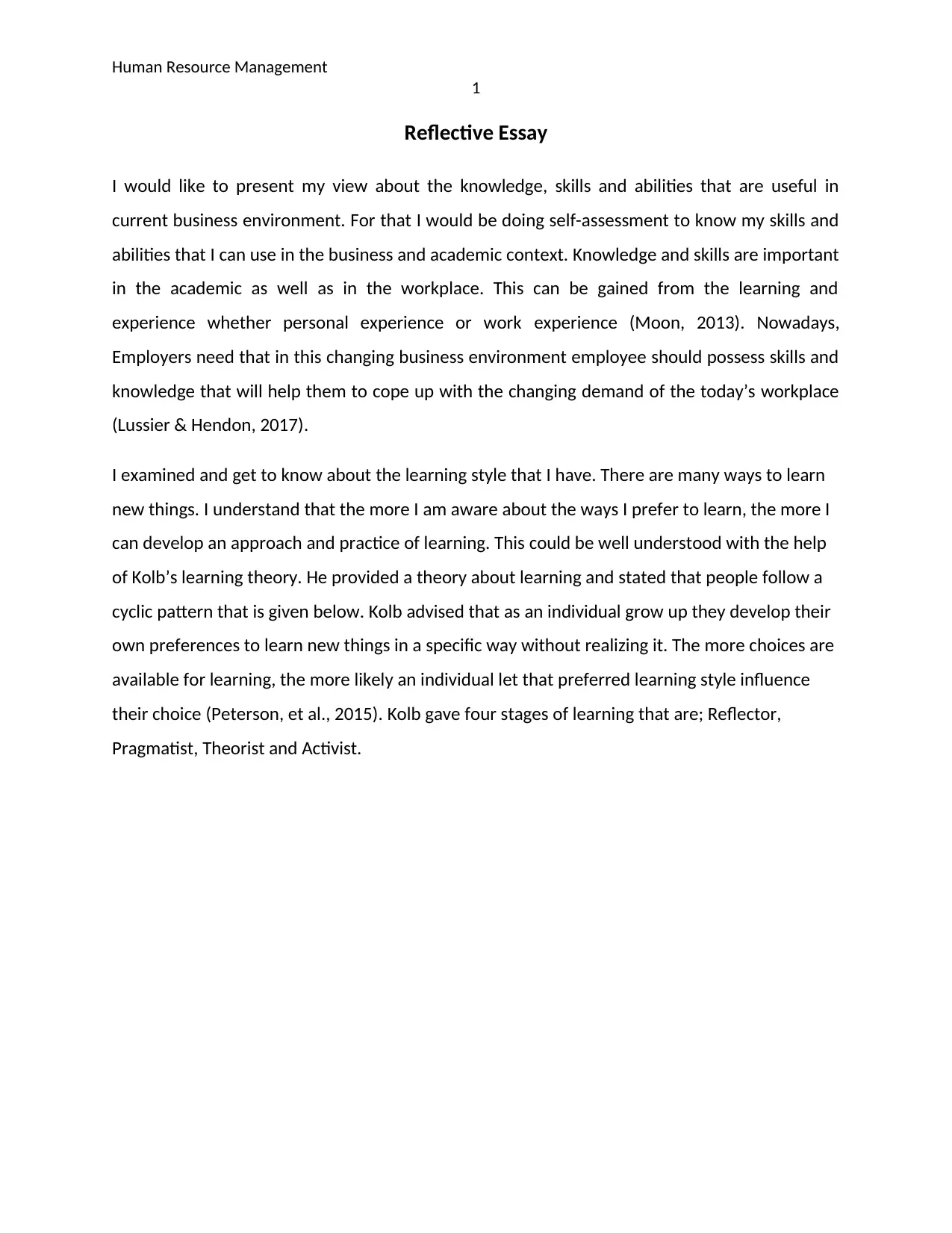
Human Resource Management
1
Reflective Essay
I would like to present my view about the knowledge, skills and abilities that are useful in
current business environment. For that I would be doing self-assessment to know my skills and
abilities that I can use in the business and academic context. Knowledge and skills are important
in the academic as well as in the workplace. This can be gained from the learning and
experience whether personal experience or work experience (Moon, 2013). Nowadays,
Employers need that in this changing business environment employee should possess skills and
knowledge that will help them to cope up with the changing demand of the today’s workplace
(Lussier & Hendon, 2017).
I examined and get to know about the learning style that I have. There are many ways to learn
new things. I understand that the more I am aware about the ways I prefer to learn, the more I
can develop an approach and practice of learning. This could be well understood with the help
of Kolb’s learning theory. He provided a theory about learning and stated that people follow a
cyclic pattern that is given below. Kolb advised that as an individual grow up they develop their
own preferences to learn new things in a specific way without realizing it. The more choices are
available for learning, the more likely an individual let that preferred learning style influence
their choice (Peterson, et al., 2015). Kolb gave four stages of learning that are; Reflector,
Pragmatist, Theorist and Activist.
1
Reflective Essay
I would like to present my view about the knowledge, skills and abilities that are useful in
current business environment. For that I would be doing self-assessment to know my skills and
abilities that I can use in the business and academic context. Knowledge and skills are important
in the academic as well as in the workplace. This can be gained from the learning and
experience whether personal experience or work experience (Moon, 2013). Nowadays,
Employers need that in this changing business environment employee should possess skills and
knowledge that will help them to cope up with the changing demand of the today’s workplace
(Lussier & Hendon, 2017).
I examined and get to know about the learning style that I have. There are many ways to learn
new things. I understand that the more I am aware about the ways I prefer to learn, the more I
can develop an approach and practice of learning. This could be well understood with the help
of Kolb’s learning theory. He provided a theory about learning and stated that people follow a
cyclic pattern that is given below. Kolb advised that as an individual grow up they develop their
own preferences to learn new things in a specific way without realizing it. The more choices are
available for learning, the more likely an individual let that preferred learning style influence
their choice (Peterson, et al., 2015). Kolb gave four stages of learning that are; Reflector,
Pragmatist, Theorist and Activist.
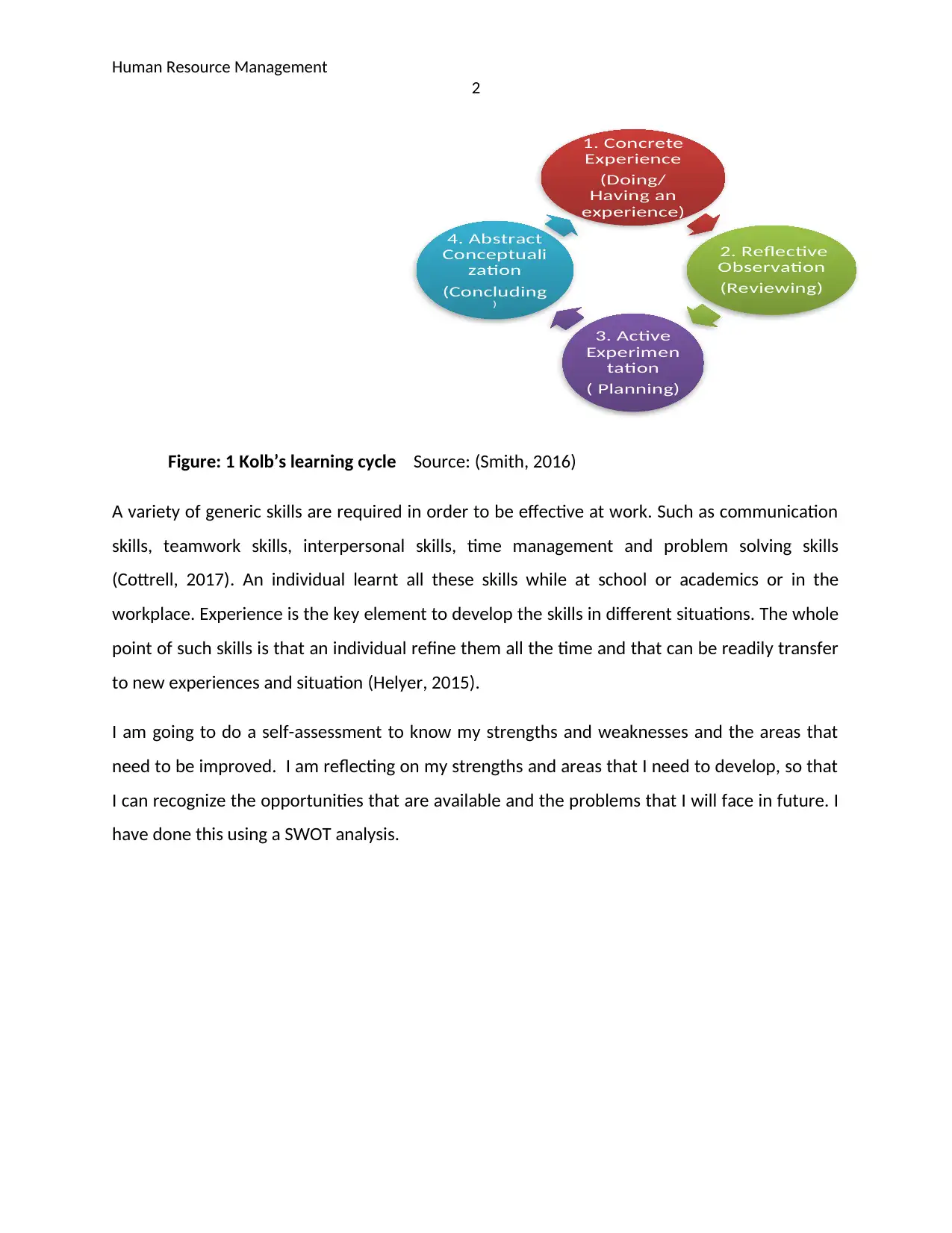
Human Resource Management
2
Figure: 1 Kolb’s learning cycle Source: (Smith, 2016)
A variety of generic skills are required in order to be effective at work. Such as communication
skills, teamwork skills, interpersonal skills, time management and problem solving skills
(Cottrell, 2017). An individual learnt all these skills while at school or academics or in the
workplace. Experience is the key element to develop the skills in different situations. The whole
point of such skills is that an individual refine them all the time and that can be readily transfer
to new experiences and situation (Helyer, 2015).
I am going to do a self-assessment to know my strengths and weaknesses and the areas that
need to be improved. I am reflecting on my strengths and areas that I need to develop, so that
I can recognize the opportunities that are available and the problems that I will face in future. I
have done this using a SWOT analysis.
1. Concrete
Experience
(Doing/
Having an
experience)
2. Reflective
Observation
(Reviewing)
3. Active
Experimen
tation
( Planning)
4. Abstract
Conceptuali
zation
(Concluding
)
2
Figure: 1 Kolb’s learning cycle Source: (Smith, 2016)
A variety of generic skills are required in order to be effective at work. Such as communication
skills, teamwork skills, interpersonal skills, time management and problem solving skills
(Cottrell, 2017). An individual learnt all these skills while at school or academics or in the
workplace. Experience is the key element to develop the skills in different situations. The whole
point of such skills is that an individual refine them all the time and that can be readily transfer
to new experiences and situation (Helyer, 2015).
I am going to do a self-assessment to know my strengths and weaknesses and the areas that
need to be improved. I am reflecting on my strengths and areas that I need to develop, so that
I can recognize the opportunities that are available and the problems that I will face in future. I
have done this using a SWOT analysis.
1. Concrete
Experience
(Doing/
Having an
experience)
2. Reflective
Observation
(Reviewing)
3. Active
Experimen
tation
( Planning)
4. Abstract
Conceptuali
zation
(Concluding
)
⊘ This is a preview!⊘
Do you want full access?
Subscribe today to unlock all pages.

Trusted by 1+ million students worldwide
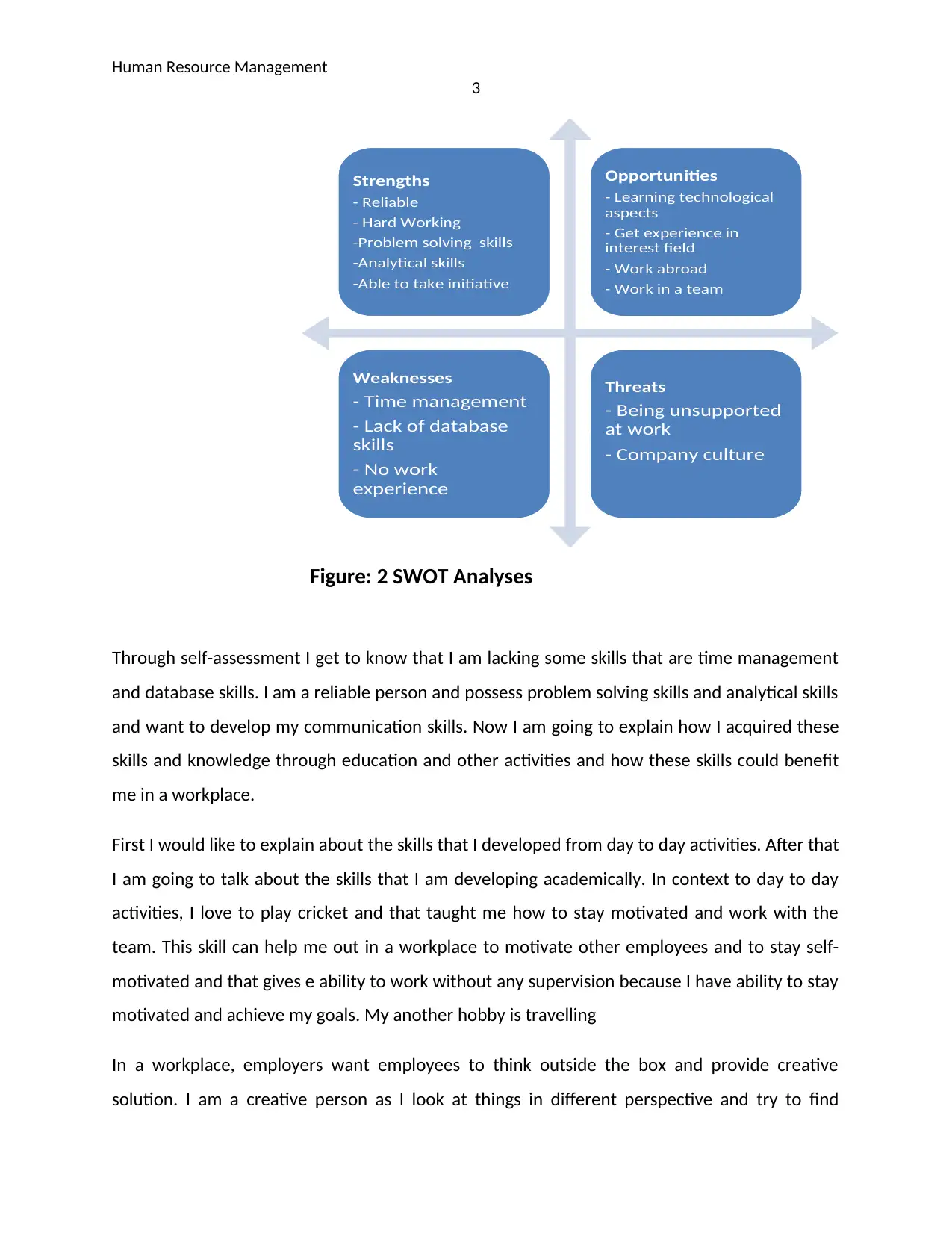
Human Resource Management
3
Figure: 2 SWOT Analyses
Through self-assessment I get to know that I am lacking some skills that are time management
and database skills. I am a reliable person and possess problem solving skills and analytical skills
and want to develop my communication skills. Now I am going to explain how I acquired these
skills and knowledge through education and other activities and how these skills could benefit
me in a workplace.
First I would like to explain about the skills that I developed from day to day activities. After that
I am going to talk about the skills that I am developing academically. In context to day to day
activities, I love to play cricket and that taught me how to stay motivated and work with the
team. This skill can help me out in a workplace to motivate other employees and to stay self-
motivated and that gives e ability to work without any supervision because I have ability to stay
motivated and achieve my goals. My another hobby is travelling
In a workplace, employers want employees to think outside the box and provide creative
solution. I am a creative person as I look at things in different perspective and try to find
Strengths
- Reliable
- Hard Working
-Problem solving skills
-Analytical skills
-Able to take initiative
Opportunities
- Learning technological
aspects
- Get experience in
interest field
- Work abroad
- Work in a team
Weaknesses
- Time management
- Lack of database
skills
- No work
experience
Threats
- Being unsupported
at work
- Company culture
3
Figure: 2 SWOT Analyses
Through self-assessment I get to know that I am lacking some skills that are time management
and database skills. I am a reliable person and possess problem solving skills and analytical skills
and want to develop my communication skills. Now I am going to explain how I acquired these
skills and knowledge through education and other activities and how these skills could benefit
me in a workplace.
First I would like to explain about the skills that I developed from day to day activities. After that
I am going to talk about the skills that I am developing academically. In context to day to day
activities, I love to play cricket and that taught me how to stay motivated and work with the
team. This skill can help me out in a workplace to motivate other employees and to stay self-
motivated and that gives e ability to work without any supervision because I have ability to stay
motivated and achieve my goals. My another hobby is travelling
In a workplace, employers want employees to think outside the box and provide creative
solution. I am a creative person as I look at things in different perspective and try to find
Strengths
- Reliable
- Hard Working
-Problem solving skills
-Analytical skills
-Able to take initiative
Opportunities
- Learning technological
aspects
- Get experience in
interest field
- Work abroad
- Work in a team
Weaknesses
- Time management
- Lack of database
skills
- No work
experience
Threats
- Being unsupported
at work
- Company culture
Paraphrase This Document
Need a fresh take? Get an instant paraphrase of this document with our AI Paraphraser
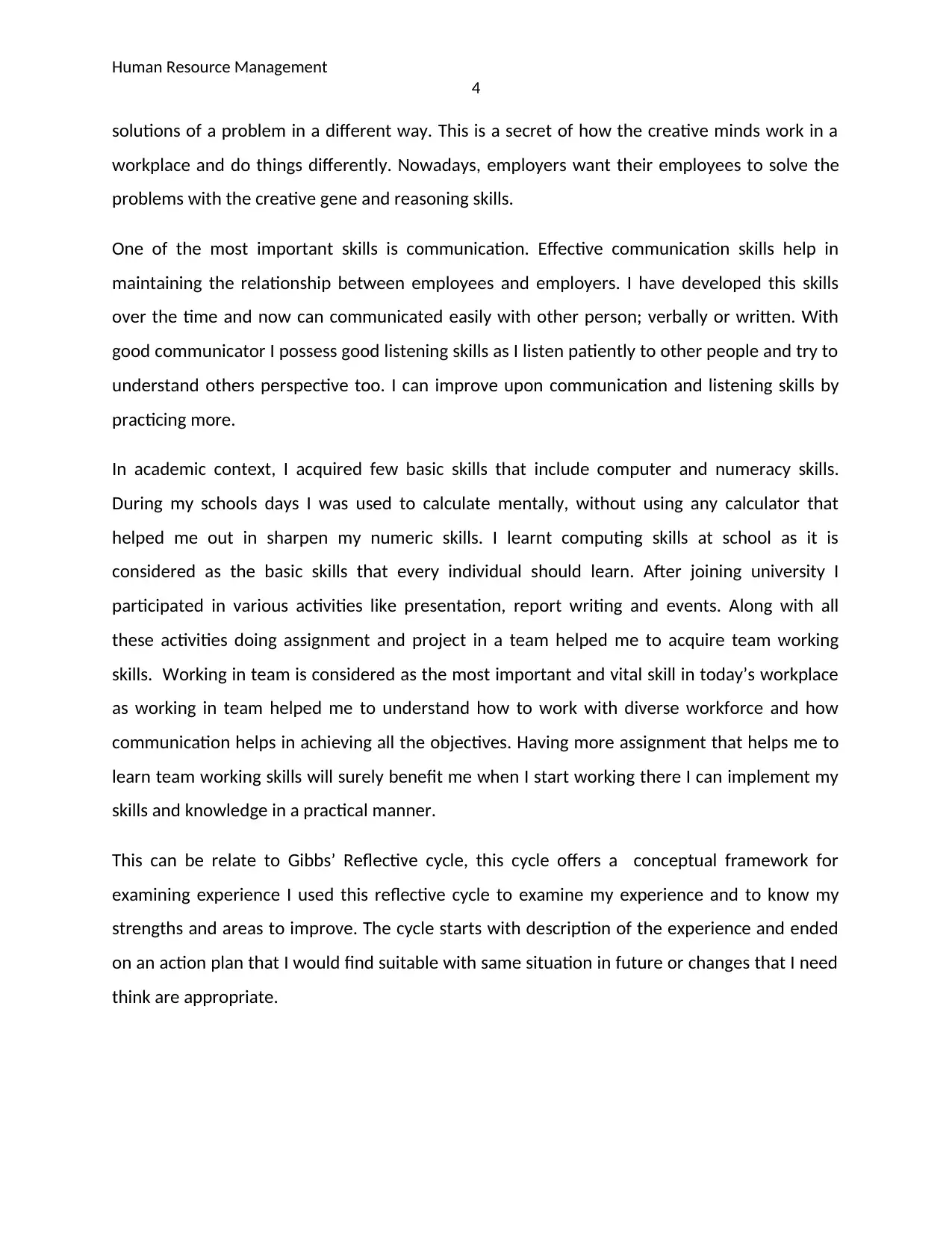
Human Resource Management
4
solutions of a problem in a different way. This is a secret of how the creative minds work in a
workplace and do things differently. Nowadays, employers want their employees to solve the
problems with the creative gene and reasoning skills.
One of the most important skills is communication. Effective communication skills help in
maintaining the relationship between employees and employers. I have developed this skills
over the time and now can communicated easily with other person; verbally or written. With
good communicator I possess good listening skills as I listen patiently to other people and try to
understand others perspective too. I can improve upon communication and listening skills by
practicing more.
In academic context, I acquired few basic skills that include computer and numeracy skills.
During my schools days I was used to calculate mentally, without using any calculator that
helped me out in sharpen my numeric skills. I learnt computing skills at school as it is
considered as the basic skills that every individual should learn. After joining university I
participated in various activities like presentation, report writing and events. Along with all
these activities doing assignment and project in a team helped me to acquire team working
skills. Working in team is considered as the most important and vital skill in today’s workplace
as working in team helped me to understand how to work with diverse workforce and how
communication helps in achieving all the objectives. Having more assignment that helps me to
learn team working skills will surely benefit me when I start working there I can implement my
skills and knowledge in a practical manner.
This can be relate to Gibbs’ Reflective cycle, this cycle offers a conceptual framework for
examining experience I used this reflective cycle to examine my experience and to know my
strengths and areas to improve. The cycle starts with description of the experience and ended
on an action plan that I would find suitable with same situation in future or changes that I need
think are appropriate.
4
solutions of a problem in a different way. This is a secret of how the creative minds work in a
workplace and do things differently. Nowadays, employers want their employees to solve the
problems with the creative gene and reasoning skills.
One of the most important skills is communication. Effective communication skills help in
maintaining the relationship between employees and employers. I have developed this skills
over the time and now can communicated easily with other person; verbally or written. With
good communicator I possess good listening skills as I listen patiently to other people and try to
understand others perspective too. I can improve upon communication and listening skills by
practicing more.
In academic context, I acquired few basic skills that include computer and numeracy skills.
During my schools days I was used to calculate mentally, without using any calculator that
helped me out in sharpen my numeric skills. I learnt computing skills at school as it is
considered as the basic skills that every individual should learn. After joining university I
participated in various activities like presentation, report writing and events. Along with all
these activities doing assignment and project in a team helped me to acquire team working
skills. Working in team is considered as the most important and vital skill in today’s workplace
as working in team helped me to understand how to work with diverse workforce and how
communication helps in achieving all the objectives. Having more assignment that helps me to
learn team working skills will surely benefit me when I start working there I can implement my
skills and knowledge in a practical manner.
This can be relate to Gibbs’ Reflective cycle, this cycle offers a conceptual framework for
examining experience I used this reflective cycle to examine my experience and to know my
strengths and areas to improve. The cycle starts with description of the experience and ended
on an action plan that I would find suitable with same situation in future or changes that I need
think are appropriate.
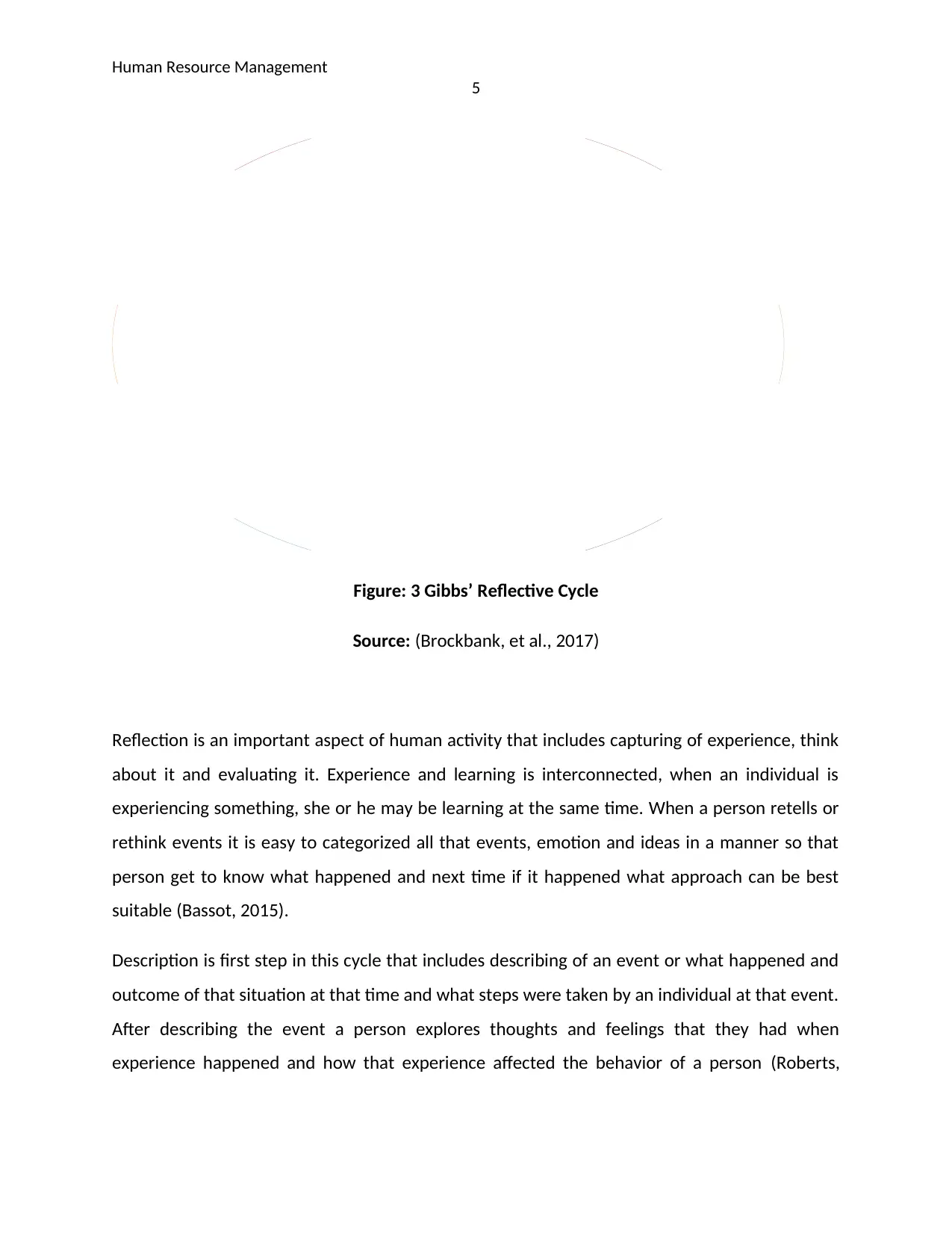
Human Resource Management
5
Figure: 3 Gibbs’ Reflective Cycle
Source: (Brockbank, et al., 2017)
Reflection is an important aspect of human activity that includes capturing of experience, think
about it and evaluating it. Experience and learning is interconnected, when an individual is
experiencing something, she or he may be learning at the same time. When a person retells or
rethink events it is easy to categorized all that events, emotion and ideas in a manner so that
person get to know what happened and next time if it happened what approach can be best
suitable (Bassot, 2015).
Description is first step in this cycle that includes describing of an event or what happened and
outcome of that situation at that time and what steps were taken by an individual at that event.
After describing the event a person explores thoughts and feelings that they had when
experience happened and how that experience affected the behavior of a person (Roberts,
Descri ptio n
Feelin g
Evalua ting
Analys is
Conclu sion
Action Pla n
5
Figure: 3 Gibbs’ Reflective Cycle
Source: (Brockbank, et al., 2017)
Reflection is an important aspect of human activity that includes capturing of experience, think
about it and evaluating it. Experience and learning is interconnected, when an individual is
experiencing something, she or he may be learning at the same time. When a person retells or
rethink events it is easy to categorized all that events, emotion and ideas in a manner so that
person get to know what happened and next time if it happened what approach can be best
suitable (Bassot, 2015).
Description is first step in this cycle that includes describing of an event or what happened and
outcome of that situation at that time and what steps were taken by an individual at that event.
After describing the event a person explores thoughts and feelings that they had when
experience happened and how that experience affected the behavior of a person (Roberts,
Descri ptio n
Feelin g
Evalua ting
Analys is
Conclu sion
Action Pla n
⊘ This is a preview!⊘
Do you want full access?
Subscribe today to unlock all pages.

Trusted by 1+ million students worldwide
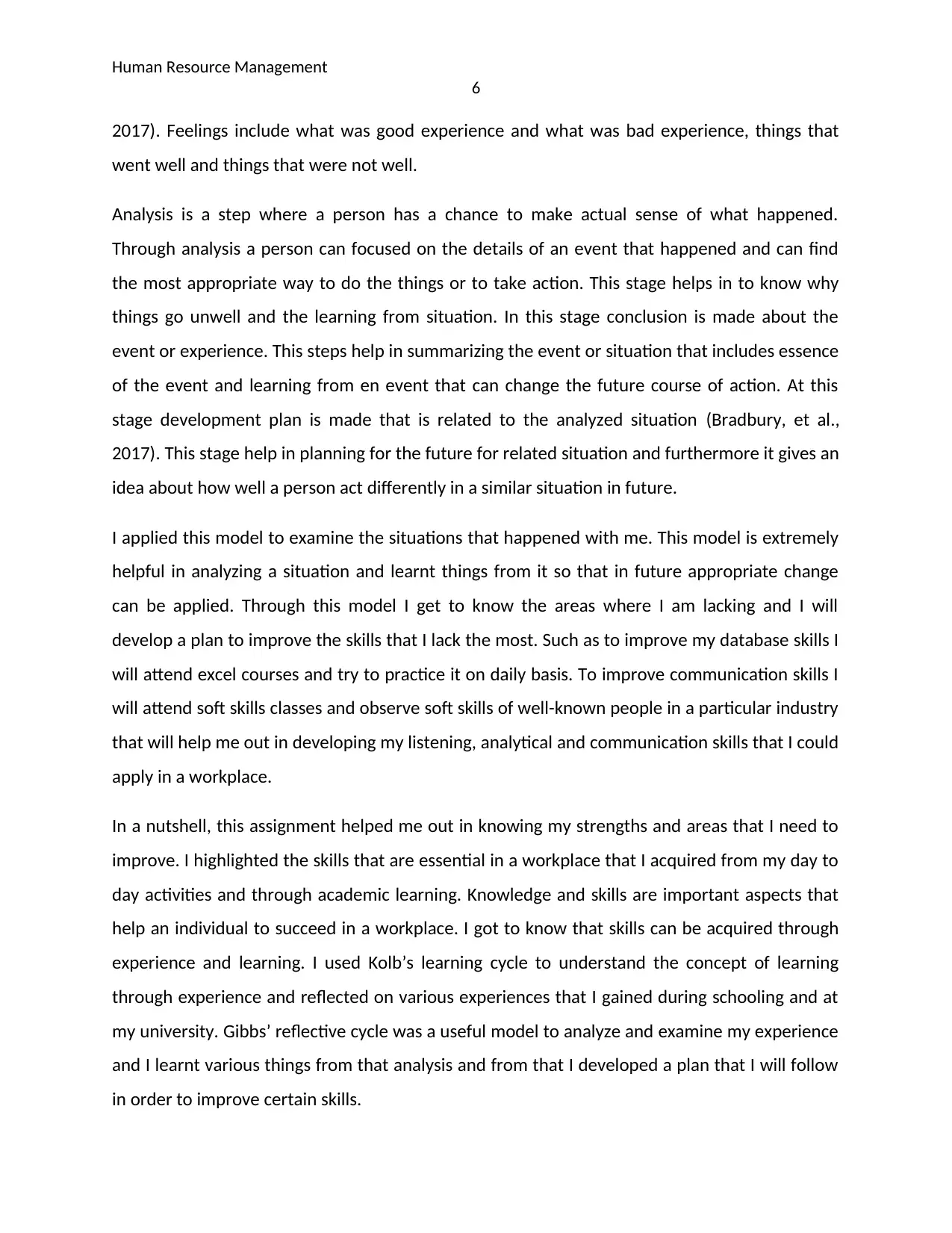
Human Resource Management
6
2017). Feelings include what was good experience and what was bad experience, things that
went well and things that were not well.
Analysis is a step where a person has a chance to make actual sense of what happened.
Through analysis a person can focused on the details of an event that happened and can find
the most appropriate way to do the things or to take action. This stage helps in to know why
things go unwell and the learning from situation. In this stage conclusion is made about the
event or experience. This steps help in summarizing the event or situation that includes essence
of the event and learning from en event that can change the future course of action. At this
stage development plan is made that is related to the analyzed situation (Bradbury, et al.,
2017). This stage help in planning for the future for related situation and furthermore it gives an
idea about how well a person act differently in a similar situation in future.
I applied this model to examine the situations that happened with me. This model is extremely
helpful in analyzing a situation and learnt things from it so that in future appropriate change
can be applied. Through this model I get to know the areas where I am lacking and I will
develop a plan to improve the skills that I lack the most. Such as to improve my database skills I
will attend excel courses and try to practice it on daily basis. To improve communication skills I
will attend soft skills classes and observe soft skills of well-known people in a particular industry
that will help me out in developing my listening, analytical and communication skills that I could
apply in a workplace.
In a nutshell, this assignment helped me out in knowing my strengths and areas that I need to
improve. I highlighted the skills that are essential in a workplace that I acquired from my day to
day activities and through academic learning. Knowledge and skills are important aspects that
help an individual to succeed in a workplace. I got to know that skills can be acquired through
experience and learning. I used Kolb’s learning cycle to understand the concept of learning
through experience and reflected on various experiences that I gained during schooling and at
my university. Gibbs’ reflective cycle was a useful model to analyze and examine my experience
and I learnt various things from that analysis and from that I developed a plan that I will follow
in order to improve certain skills.
6
2017). Feelings include what was good experience and what was bad experience, things that
went well and things that were not well.
Analysis is a step where a person has a chance to make actual sense of what happened.
Through analysis a person can focused on the details of an event that happened and can find
the most appropriate way to do the things or to take action. This stage helps in to know why
things go unwell and the learning from situation. In this stage conclusion is made about the
event or experience. This steps help in summarizing the event or situation that includes essence
of the event and learning from en event that can change the future course of action. At this
stage development plan is made that is related to the analyzed situation (Bradbury, et al.,
2017). This stage help in planning for the future for related situation and furthermore it gives an
idea about how well a person act differently in a similar situation in future.
I applied this model to examine the situations that happened with me. This model is extremely
helpful in analyzing a situation and learnt things from it so that in future appropriate change
can be applied. Through this model I get to know the areas where I am lacking and I will
develop a plan to improve the skills that I lack the most. Such as to improve my database skills I
will attend excel courses and try to practice it on daily basis. To improve communication skills I
will attend soft skills classes and observe soft skills of well-known people in a particular industry
that will help me out in developing my listening, analytical and communication skills that I could
apply in a workplace.
In a nutshell, this assignment helped me out in knowing my strengths and areas that I need to
improve. I highlighted the skills that are essential in a workplace that I acquired from my day to
day activities and through academic learning. Knowledge and skills are important aspects that
help an individual to succeed in a workplace. I got to know that skills can be acquired through
experience and learning. I used Kolb’s learning cycle to understand the concept of learning
through experience and reflected on various experiences that I gained during schooling and at
my university. Gibbs’ reflective cycle was a useful model to analyze and examine my experience
and I learnt various things from that analysis and from that I developed a plan that I will follow
in order to improve certain skills.
Paraphrase This Document
Need a fresh take? Get an instant paraphrase of this document with our AI Paraphraser
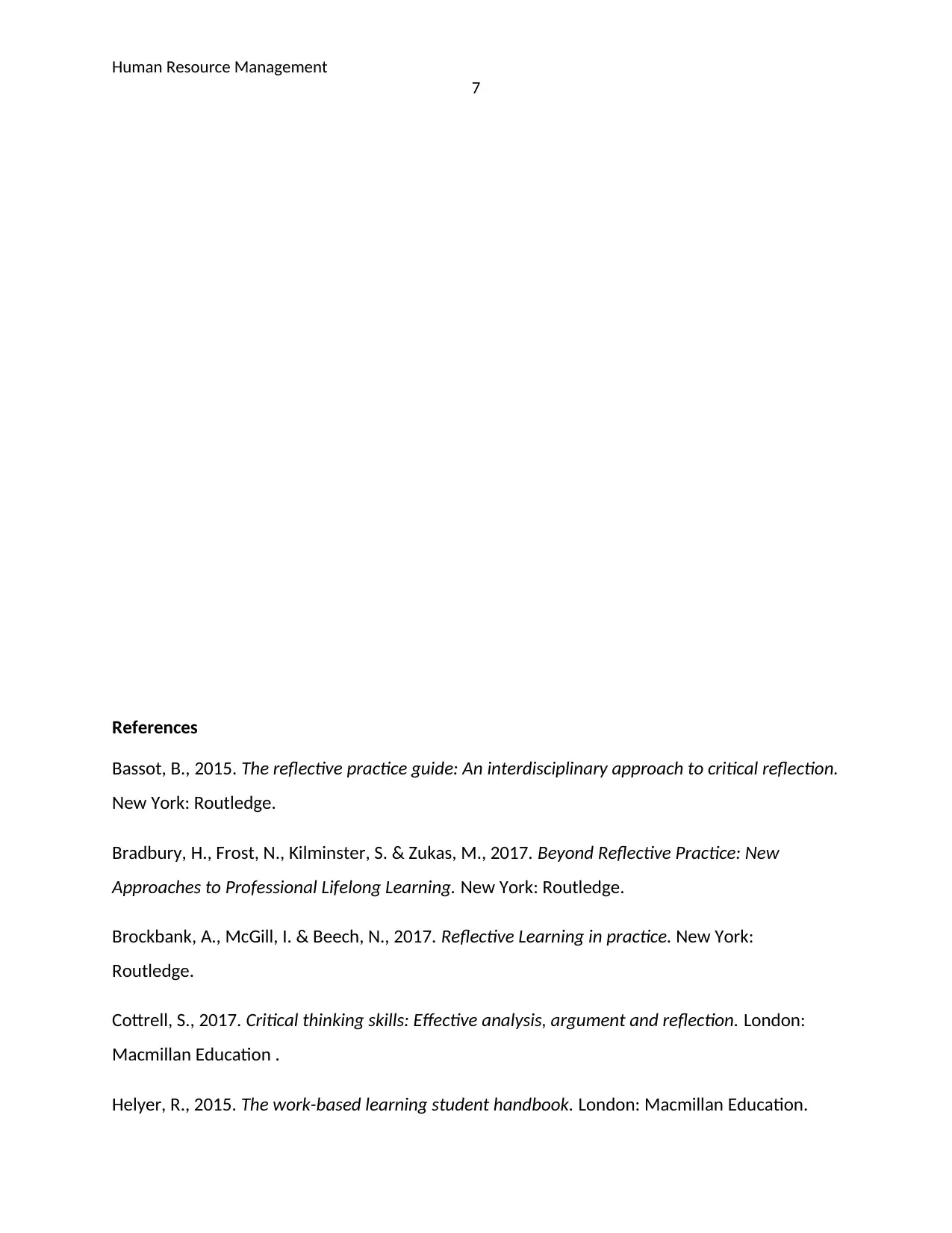
Human Resource Management
7
References
Bassot, B., 2015. The reflective practice guide: An interdisciplinary approach to critical reflection.
New York: Routledge.
Bradbury, H., Frost, N., Kilminster, S. & Zukas, M., 2017. Beyond Reflective Practice: New
Approaches to Professional Lifelong Learning. New York: Routledge.
Brockbank, A., McGill, I. & Beech, N., 2017. Reflective Learning in practice. New York:
Routledge.
Cottrell, S., 2017. Critical thinking skills: Effective analysis, argument and reflection. London:
Macmillan Education .
Helyer, R., 2015. The work-based learning student handbook. London: Macmillan Education.
7
References
Bassot, B., 2015. The reflective practice guide: An interdisciplinary approach to critical reflection.
New York: Routledge.
Bradbury, H., Frost, N., Kilminster, S. & Zukas, M., 2017. Beyond Reflective Practice: New
Approaches to Professional Lifelong Learning. New York: Routledge.
Brockbank, A., McGill, I. & Beech, N., 2017. Reflective Learning in practice. New York:
Routledge.
Cottrell, S., 2017. Critical thinking skills: Effective analysis, argument and reflection. London:
Macmillan Education .
Helyer, R., 2015. The work-based learning student handbook. London: Macmillan Education.
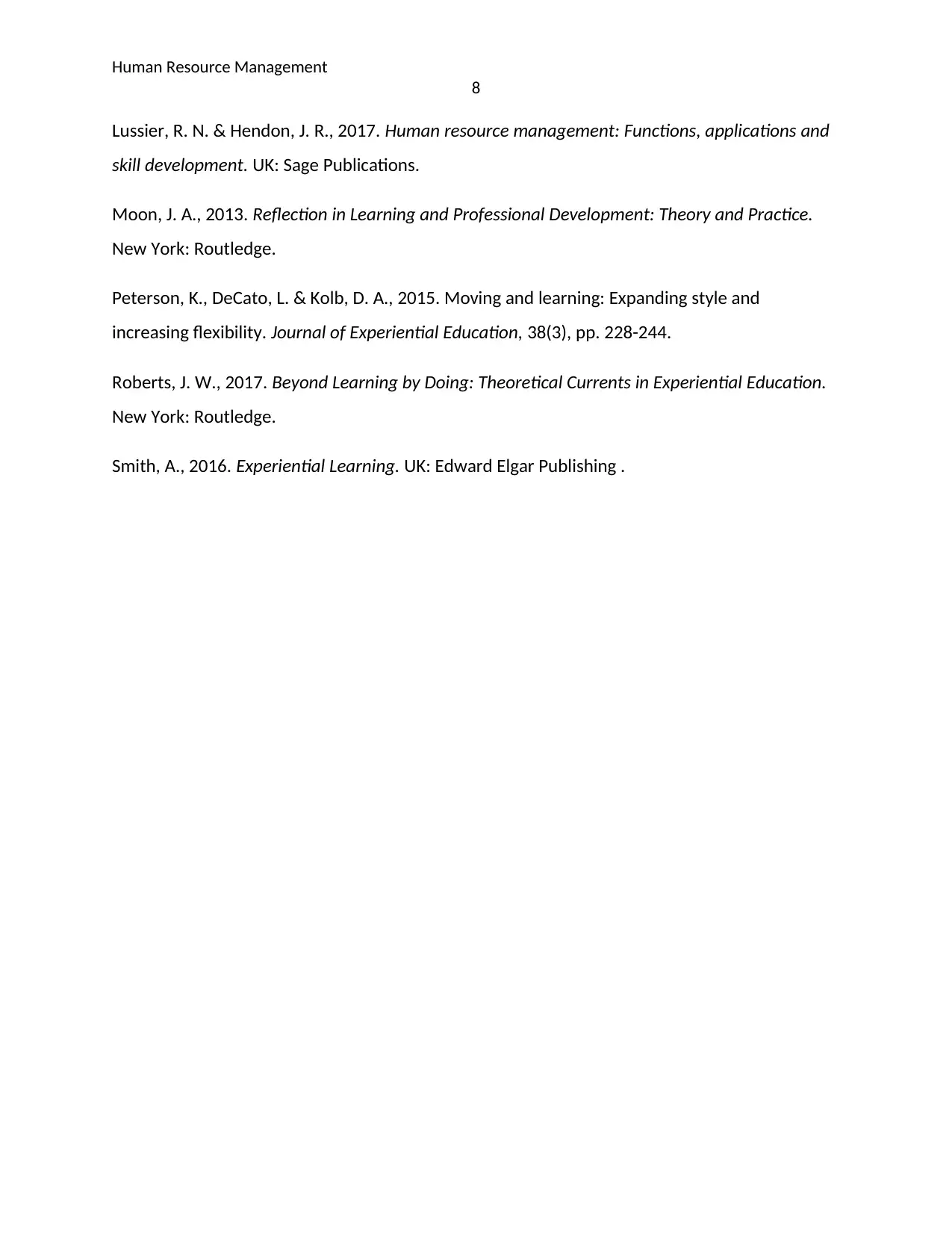
Human Resource Management
8
Lussier, R. N. & Hendon, J. R., 2017. Human resource management: Functions, applications and
skill development. UK: Sage Publications.
Moon, J. A., 2013. Reflection in Learning and Professional Development: Theory and Practice.
New York: Routledge.
Peterson, K., DeCato, L. & Kolb, D. A., 2015. Moving and learning: Expanding style and
increasing flexibility. Journal of Experiential Education, 38(3), pp. 228-244.
Roberts, J. W., 2017. Beyond Learning by Doing: Theoretical Currents in Experiential Education.
New York: Routledge.
Smith, A., 2016. Experiential Learning. UK: Edward Elgar Publishing .
8
Lussier, R. N. & Hendon, J. R., 2017. Human resource management: Functions, applications and
skill development. UK: Sage Publications.
Moon, J. A., 2013. Reflection in Learning and Professional Development: Theory and Practice.
New York: Routledge.
Peterson, K., DeCato, L. & Kolb, D. A., 2015. Moving and learning: Expanding style and
increasing flexibility. Journal of Experiential Education, 38(3), pp. 228-244.
Roberts, J. W., 2017. Beyond Learning by Doing: Theoretical Currents in Experiential Education.
New York: Routledge.
Smith, A., 2016. Experiential Learning. UK: Edward Elgar Publishing .
⊘ This is a preview!⊘
Do you want full access?
Subscribe today to unlock all pages.

Trusted by 1+ million students worldwide
1 out of 9
Related Documents
Your All-in-One AI-Powered Toolkit for Academic Success.
+13062052269
info@desklib.com
Available 24*7 on WhatsApp / Email
![[object Object]](/_next/static/media/star-bottom.7253800d.svg)
Unlock your academic potential
Copyright © 2020–2026 A2Z Services. All Rights Reserved. Developed and managed by ZUCOL.


